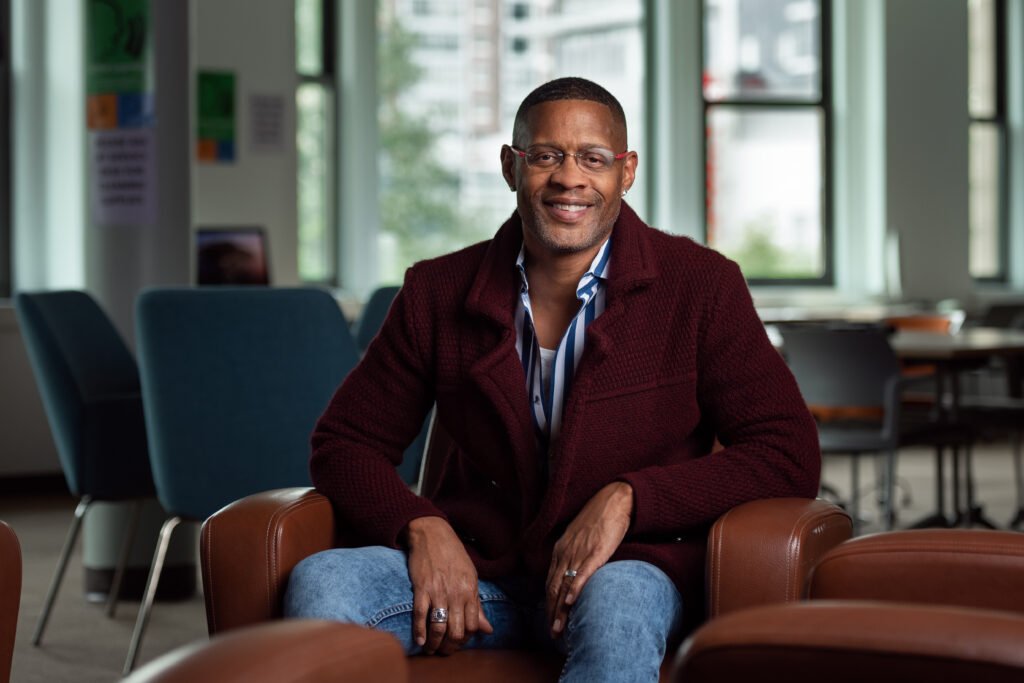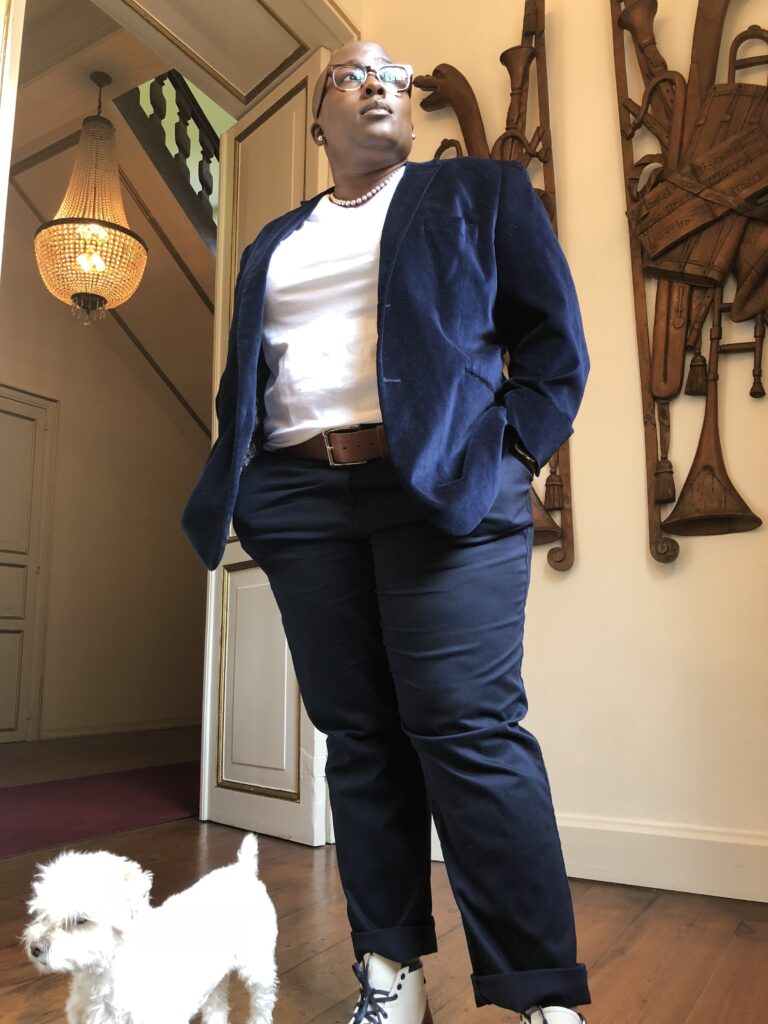At the Crossroads: New Internationalization and Equity Roles to Expand Opportunity at Emerson

Dr. Anthony Pinder has done a lot at Emerson since arriving in 2014 to lead the College’s globalization initiatives. He’s overseen the development of nearly 20 internationalized courses across campus and close to two dozen Global Pathways study abroad programs. Last year, Emerson won the prestigious Sen. Paul Simon Award for Comprehensive Internationalization from NAFSA, the world’s largest association for international educators in higher ed.
But it may be his new role as Vice Provost for Internationalization and Equity that will prove the most far-reaching and cutting-edge.
Pinder will continue to lead International Student Affairs, Education Abroad & Domestic Programs, English Language Learning, Emerson’s Netherlands campus, international partnerships and initiatives supporting international fellowships/awards, international scholars, and international faculty support. What’s new is an explicit and intensified focus on equity work, both for international students and faculty, as well as BIPOC and LGBTQ communities, and those with disabilities across campus.
“I’m so proud of Emerson because … it’s a rare position,” Pinder said of his new title. “We are a small fraternity of institutions that have thought of it this way. I’m extra proud, because on the internationalization side of the house, we lead the nation, in terms of what we’ve been doing. For us to look toward the future, for us to sit and [ask], ‘What do we do now, what’s the next level?’ This is the next level, I think.”
The creation of the vice provost for internationalization and equity position goes hand-in-hand with Emerson’s Community Equity Action Plan, a series of concrete steps toward equity and anti-racism that the College has committed to take following the November 2020 ESOC Week of Action and student demands.
Another position created this spring was that of assistant dean of global and equity education, being filled by Tikesha Morgan, a 15-year veteran of Emerson College, former director of Multicultural (now Intercultural) Student Affairs, and most recently, senior advisor for student affairs at Kasteel Well. And Christopher Grant, a former associate director of enrollment, was promoted to director of student success, access, and belonging.
Big Job
Pinder said one of his main priorities this year will be creating more of a coordinated structure around the many equity, diversity, and inclusion initiatives going on across campus divisions. He also anticipates working more closely with Academic Affairs not just to hire faculty from historically underrepresented communities, but also to make sure they get the mentoring and support they need once on campus.
“There’s nothing really broken about the hiring,” he said. “It’s really the retention [that requires new focus], to make sure that once we hire these wonderful people, we keep them — mentoring them, making sure they make tenure.”
While an administrative position that formally combines internationalization and equity may still be uncommon in higher ed, the two issues are closely related.
International students (of which the College has almost 800) and faculty encounter many of the same or similar challenges as U.S.-born students and faculty from marginalized communities when it comes to issues of access, opportunity, and feeling fully a part of the Emerson community.
“Equity means that we are creating programs, we are creating opportunity, and we want everyone to have the same opportunity [to succeed],” Pinder said.
Mitigating those challenges will require training faculty and staff to better understand all the complexities and experiences of these students, he said.
Among the unknowns heading into the new academic year will be who succeeds Lee Pelton as president, and who follows Sylvia Spears as vice president for social justice. On top of that, coordinating all the equity work happening at Emerson is a gargantuan job, and there are staffing gaps that will need to be filled in order to put that good work into practice, Pinder said.
But he’s up to it.
Pinder is an expert on the internationalization of Historically Black Colleges/Universities, and before joining Emerson, served in faculty and administrative positions at several HBCUs, including Morehouse College and Dillard University, as well as Georgia Gwinnett College, an open-access institution. Prior to that, he had a career as national director of minority recruitment for the U.S. Peace Corps.
“It’s not new to me, this conversation,” Pinder said. “One thing I’m certain I bring to any table is empowering people. I hope in this role, I’m able to continue doing that.”

Expanding Minds
Tikesha Morgan is one of the people Pinder is empowering.
As she returns from Well this summer to start her new job as assistant dean of global and equity education, her priorities will be to maintain strong connections between Boston and its various campuses and international partners, and to create a sense of possibility and excitement around study abroad for Emerson students from marginalized communities.
Though she’s now officially in Academic Affairs, Morgan will continue to oversee student affairs at Kasteel Well remotely, and will work with colleagues at Paris College of Art and Franklin University in Switzerland to improve the out-of-classroom experience for students from around the world.
“Student Affairs is a very American thing. There are other institutions that have it in very different forms,” Morgan said. “I’ll look at where we meet in the middle … [and find out] what do they have there, what can we build up to make sure there’s always communication between institutions for outside-classroom experience.”
Morgan has spent the past five years living in the Netherlands and traveling across Europe with students spending a semester at Kasteel Well, but when she was a college student, doing a semester abroad never struck her as a possibility. She wants something different for BIPOC and other marginalized students at Emerson.
“How do we explain how this can be an option for you, and how can we take this dream you have and make it a reality?” Morgan said, adding that in addition to more formal marketing/communication channels, she plans to be out and about on campus, striking up conversations with students about how travel is both life-changing and within reach.
For many marginalized students, finances may be a barrier to studying abroad, but it’s not necessarily the biggest obstacle, and for many BIPOC students, money isn’t the issue at all, Morgan said.
“I think the U.S. can sell us [this idea] that as a BIPOC person, this is the safest place for you to be, when in actuality, there are spaces and places around the world where we’re treated a lot better within those communities,” she said.
Morgan hopes to give students the inspiration and encouragement to consider international study, direct them to resources to make that possible if finances are an issue, and provide her own personal insight and honest advice for traveling abroad as a Black, queer woman.
“How do we start to change those mindsets, and convince them it’s not just about going and having fun, it’s about expanding minds?” she said.
Categories